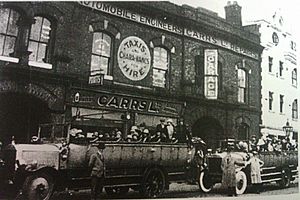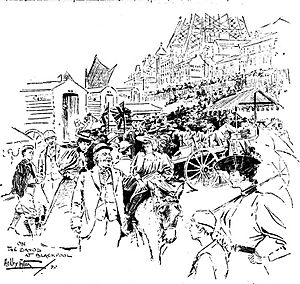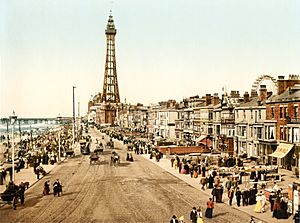Wakes week facts for kids
The Wakes Week was a special holiday time in parts of England and Scotland. It started as a religious festival, but over time, it became a regular summer break, especially in places like North West England during the Industrial Revolution. In Scotland, a similar holiday was called "Trades Fortnight," where workers had two weeks off in summer.
This tradition was very popular in the 1800s and 1900s. However, today, Wakes Week has mostly disappeared. This is because many old factories closed down, and school holidays became the same for everyone.
Contents
How Wakes Week Started
Long ago, when English churches were built, they were named after a patron saint. The day the church was dedicated, or the saint's special day, became the church's yearly festival.
Church services would begin on Saturday evening. This night of prayer was called a "wake." This word comes from an old English word, waecan, meaning "to wake."
Each village would have a wake celebration. These events included religious parts, like rushbearing, where people carried rushes to decorate the church. Afterward, there were fun activities like sports, games, dancing, and even drinking.
As these wakes became less religious, the noisier fun activities moved to Saturday. Monday was then kept for public entertainment, such as bands, games, and funfairs.
Wakes Week in the Industrial Age

During the Industrial Revolution, many factories and mines opened. The old wakes tradition changed into a regular summer holiday. This happened mostly in the North of England and some industrial areas of the the Midlands.
Each town would pick a different week in the summer for their Wakes Week. During this time, local factories, mines, and other businesses would close for a whole week. This holiday first started as an unpaid break. Factories closed for cleaning and repairs.
Holiday Agreements
In Lancashire, different towns took their holidays on different weeks. This meant that from June to September, a different town was on holiday each week.
In 1906, an agreement was made about unpaid holidays. This set the pattern for Wakes holidays in Lancashire mill towns. From 1907, workers were guaranteed 12 days of holiday each year, including bank holidays. This was increased to 15 days in 1915.
Trips to the Seaside

Many working-class people in the North of England believed that swimming in the sea in August and September was good for their health. They said there was "physic in the sea."
The growth of the railway network made it easier to travel. Blackpool became a popular seaside resort for working-class families from Lancashire. Southport was for those who were a bit wealthier. Morecambe attracted visitors from the textile towns of West Riding.
The railway line from the mill town of Oldham to Blackpool was finished in 1846. In 1860, which was a very busy year, over 23,000 holidaymakers traveled from Oldham alone to Blackpool during Wakes Week on special trains.
Saving for Holidays
In the late 1800s, trips changed from just day trips to full weeks away. "Wakes Saving" or "Going-Off" clubs became very popular. People would save a little money each week to pay for their holiday. These saving clubs were common in the industrial North until paid holidays became normal in the 1940s and 1950s.
Wakes Week Today
The Wakes Week tradition has mostly disappeared in the UK now. This is because many traditional factories have closed. Also, schools did not like students taking holidays during important exam times.
It used to be common for local councils to give a one-week school holiday to match Wakes Week. This was instead of holiday time at other points in the year. However, schools started to stop the Wakes Week holiday after the National Curriculum was introduced. This made school holidays the same across England.
Councils no longer have the power to set dates for public holidays. This changed after the Employment Act 1989 and the Local Government etc. (Scotland) Act 1994 were passed.
See also
- Whit Friday
 | George Robert Carruthers |
 | Patricia Bath |
 | Jan Ernst Matzeliger |
 | Alexander Miles |


